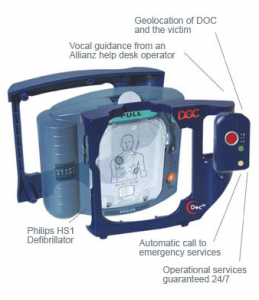British Heart Month – Most defibrillators in workplaces are effectively useless…
 Life-saving defibrillators would not be used in an emergency, survey finds
Life-saving defibrillators would not be used in an emergency, survey finds
Many heart defibrillators in British workplaces would not be used in an emergency because of misplaced fears and lack of staff education, according to a survey released today by defibrillator manufacturer DOC UK.
The firm commissioned a survey of 2,000 people which found that only 15 per cent of respondents reported they had defibrillators in their workplaces. Of those, less than half (44 per cent) reported that they knew how to use them, and 11 per cent said they had been trained, but would still not use it in a genuine emergency due to lack of confidence.
Vincent Mathieu, managing director of DOC UK, said: “With 124,000 heart attacks a year in the UK touching people of all ages and physical conditions, defibrillators are essential equipment. However they do no good if they are not used. It’s vital that companies have an on-site defibrillator that their staff will be confident to use in case of an emergency.”
The responses indicated that many people’s hesitations towards using emergency equipment are based on risks which do not exist. For instance, a defibrillator will only work on someone who is having a genuine heart attack. 61 per cent of respondents were concerned about injuring the casualty or being held liable if something went wrong and 11% of those reported that they would not use the equipment for fear of accidentally electrocuting someone who was in fact well.
Overall a third (33 per cent) of respondents said they would not use a defibrillator under any circumstances.
Dr Sarah Brewer said: “The ideal scenario is for defibrillation to be carried out by a trained paramedic; however, time is of the essence. The convention is for people to be referred to as “brain-dead” just four minutes after a cardiac arrest, and yet the target response time for an ambulance is eight minutes. This is why defibrillators at workplaces are essential. It’s also essential that people know how to use them and aren’t too scared to use them – otherwise they are no more than a high-tech wall decoration.”
When asked how they would respond if a colleague appeared to be having a heart attack, only 10 per cent said that they would use the defibrillator first. The most common response (41 per cent) was that they would call an ambulance, attempt to find the company’s first-aider, ask any colleague to take over, or ask others what to do, all before eventually using the equipment. Unfortunately, none of these reactions would be as effective as providing immediate defibrillation.
Clinical Director Dr Dennis Ferriday said: “As a practicing Clinician I often work within companies where the staff is reluctant to use work placed defibrillators. This reluctance often centres on concerns about whether the defibrillator would actually work if they used it and their feeling of isolation when initially attending the casualty.”
Vincent Mathieu, managing director of DOC UK, said, “If a paramedic is unable to arrive in time, a defibrillator could be the only way to prevent a colleague from dying. For this to work, however, companies need to alert all staff to the presence of a defibrillator, organise training on how to use the defibrillators, or buy a model, such as DOC, which instantly connects the operator to a remote call centre where an operator trained to deal with medical emergencies supports them through the process.”
Go to the main page
Tags: Business, Business Information Portal, Business News, defibrillators, Dennis Ferriday, DOC UK, Sarah Brewer, The BIP, Vincent Mathieu, West Midlands, West Midlands BIP


































